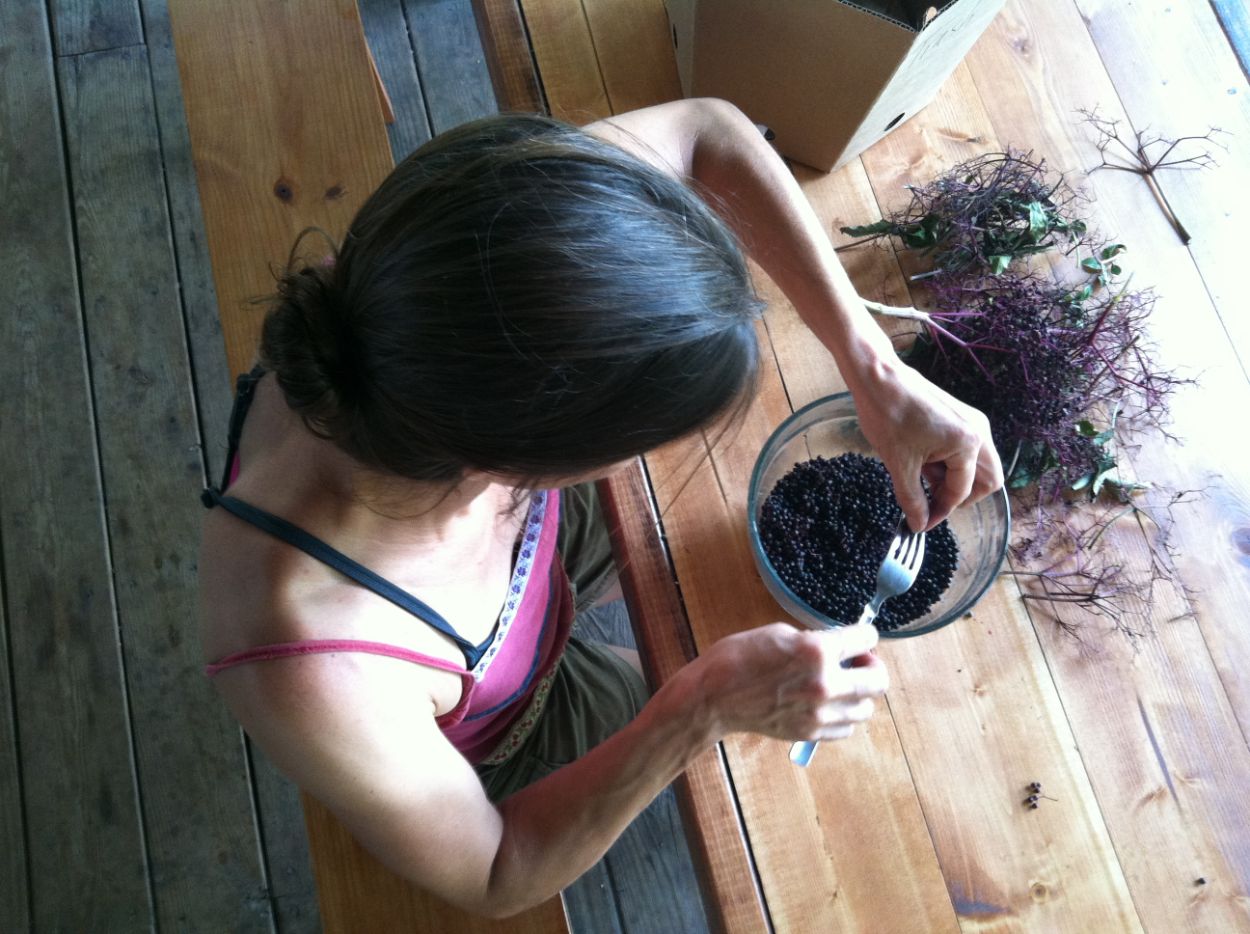Starting February 15, 2022, we will no longer purchase or eat any food from the grocery store (except salt & baking powder). Instead, we are choosing to experience what it is like to raise and forage for all of our food. This means EVERYTHING: flour, oil, honey, spices, cheese, fruits, nuts - Follow our journey and learn about feeding yourselves

Elderberries have received a lot of attention for their health benefits, and for good reason. There are a lot of good research studies to back up the claim that:
elderberry is effective for prevention and treatment of viral respiratory illness
This effect makes elderberry syrup a terrific go-to during the COVID pandemic.
Elderberry syrup has been used traditionally to treat colds and flu for hundreds of years. Initially research was conducted on the European variety, Sambucus nigra, but more and more studies verify similar benefits for the American Sambucus candadensis. Both flower and fruit extracts have been found to be effective.
Elderflower and elderberry work against respiratory viruses (such as the flu and coronavirus) by interfering with virus replication and inhibiting the virus from making its way into body cells. In addition, elder helps reduce upper respiratory inflammation and also alleviates nasal catarrh (stuffy or runny nose) from the flu, a cold, or even allergic rhinitis.
One concern with COVID-19 is a hyperactive immune response that consists of an uncontrolled release of ctyokines, which has been linked to more severe outcomes from the disease. For an excellent, albeit long and very technical description of this response, check out:
The COVID-19 Cytokine Storm; What We Know So Far - PMC (nih.gov)
OR
Early on, naturopathic practioners were worried that elderflower or elderberry treatments could exacerbate the cytokine response. This doesn't seem to be the case, anecdotally, and according to the research: Elderberry for prevention and treatment of viral respiratory illnesses: a systematic review | BMC Complementary Medicine and Therapies | Full Text (biomedcentral.com)
The short answer: taken in small doses, even daily, doesn't pose a risk. Raw berries (seeds), underripe berries, and stems are more toxic, but preparations made from either the flowers or boiled, dehydrated, or even fermented berries contain such small amounts of the toxins to be considered very safe.
Unless massive and rapid intake of cyanogenic glycosides occurs, the cyanide is quickly and safely detoxified by the liver. That said, if your child is a fan of the delicious, honey-sweetened elderberry syrup produced by the recipe below, then be sure to store safely, away from the hands of little ones!
For more scientific reassurance, check out Cyanogenic Glycoside Analysis in American Elderberry
To read more about Elderberry, there is a nice, free herbal monograph available here: Elder Monograph — HerbRally
Elderberry is a relatively low-growing shrub, ranging from 3-12' tall. Leaves are opposite (paired), but compound with usually 7 leaflets. The plant's flowers, shaped in umbels (or flat, umbrella shaped groupings) bloom anywhere from May-July and fruits ripen July-September. Berries are small, juicy, dark purple when ripe, and each contain a small seed.
Ingredients
1 cup fresh (or ½ c dried) elderberries
2 cups water
½c - 2/3 cup honey
Other optional ingredients: cinnamon, ginger root, mullein leaf, echinacea, rosehips, purple bee balm flowers &/or leaves, etc.
Directions
Strip berries from the plant. Place berries in a saucepan and cover with the water. Bring to a boil, reduce heat and simmer for 30-45 minutes.
Smash the berries & strain through a fine mesh strainer. For every cup of juice, add 1/4 - 1/3 cup or so of honey.
Bottle & store in the fridge for 2-3 months, or can immediately after making:
Submerge 8oz canning jars in water. Bring to a boil and boil for a full 10 minutes. Remove from water.
Dosage: a spoonful one to five times daily. Can take preventatively after a suspected exposure, or at the onset of respiratory symptoms or a fever.
Note: This syrup doesn't contain as much sugar as jams or jellies, and so the syrup won't last as long once opened. Store in the fridge and use it up before it ferments :) To stave off any unwanted microbial growth, add a Tbsp. of alcohol (i.e. rum) to the bottle just prior to canning, or just after opening. Alternatively, try making an elixir.
Elderberry Elixer
2 cups fresh (or 1c dried) elderberries
Honey
Alcohol of your choice - ~ 80 proof (rum)
1” fresh ginger, chopped
1 tsp. cinnamon
Peel of ½ lemon (organic)
Other optional ingredients: mullein leaf, elderflowers, echinacea, rosehips, thyme, oregano
Put the berries, lemon peel, herbs & spices in a quart jar. Fill jar a third of the way with honey. Top off with alcohol. Voila!
Screw the lid on tight, label it with the date, and keep in the dark (paper bag) for 4-6 weeks. Shake it daily. After the allotted time has passed, strain, and keep on your shelf. Keeps for ~ 1 year. No need to cook or refrigerate.
Note: since this contains raw juice, be sure only to have a therapeutic dose - up to a Tbsp. up to 3x/day max.
Starting February 15, 2022, we will no longer purchase or eat any food from the grocery store (except salt & baking powder). Instead, we are choosing to experience what it is like to raise and forage for all of our food. This means EVERYTHING: flour, oil, honey, spices, cheese, fruits, nuts - Follow our journey and learn about feeding yourselves
RESOURCE
Copyright © 2024 Barefoot Farm
Terms & Condition . Services . Careers
